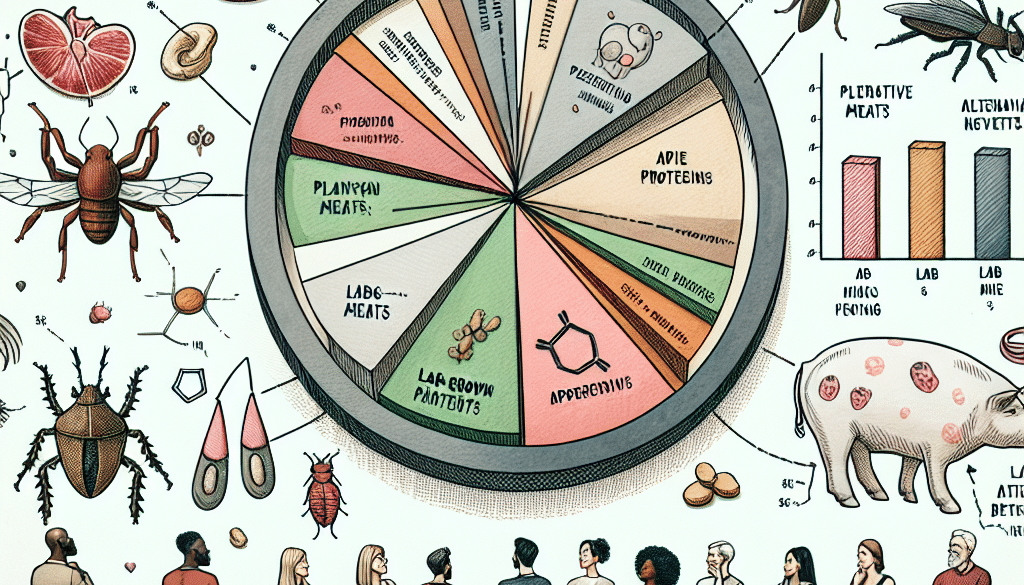Alternative Proteins: Consumers’ Perceptions Analyzed
-
Table of Contents
- Alternative Proteins: Analyzing Consumer Perceptions
- Understanding Alternative Proteins
- Consumer Perceptions of Alternative Proteins
- Taste and Culinary Experience
- Health and Nutrition
- Environmental Impact
- Ethical Considerations
- Challenges and Opportunities
- Case Studies and Statistics
- Conclusion: The Future of Protein is Here
- Discover ETChem’s Protein Products
Alternative Proteins: Analyzing Consumer Perceptions
The global food landscape is undergoing a significant transformation as consumers increasingly seek sustainable and ethical alternatives to traditional animal proteins. Alternative proteins, derived from plants, insects, algae, or cultivated in labs, are gaining traction. This shift is driven by a complex interplay of environmental concerns, health aspirations, and ethical considerations. In this article, we delve into consumer perceptions of alternative proteins, exploring the factors that influence acceptance and the challenges that lie ahead.
Understanding Alternative Proteins
Before we analyze consumer perceptions, it’s essential to understand what alternative proteins are and the variety they encompass:
- Plant-Based Proteins: These proteins are derived from plants such as soy, peas, and lentils. Brands like Beyond Meat and Impossible Foods have popularized plant-based meat alternatives.
- Insect Proteins: Insects like crickets and mealworms are being used as sustainable protein sources, with products ranging from cricket flour to insect-based snack bars.
- Algae Proteins: Microalgae like spirulina are rich in protein and are used in powders and supplements.
- Cultured or Lab-Grown Proteins: This innovative approach involves growing meat from animal cells in a lab, eliminating the need for animal slaughter.
Consumer Perceptions of Alternative Proteins
Consumer acceptance of alternative proteins is influenced by several factors, including taste, health benefits, environmental impact, and ethical considerations. Let’s explore these aspects in detail.
Taste and Culinary Experience
For many consumers, taste is paramount. Plant-based alternatives have made significant strides in replicating the taste and texture of animal proteins. Brands like Beyond Meat and Impossible Foods have conducted extensive research to create products that sizzle, smell, and taste like meat. However, there remains a segment of consumers who are skeptical about the taste of alternative proteins, which can be a barrier to widespread adoption.
Health and Nutrition
Health-conscious consumers are drawn to alternative proteins due to their perceived health benefits. Plant-based proteins often have lower levels of saturated fat and cholesterol compared to animal proteins. However, some consumers are concerned about the processing involved in creating meat alternatives and the nutritional profile of these products, such as their sodium content.
Environmental Impact
The environmental argument for alternative proteins is compelling. The production of plant-based proteins typically requires less land, water, and energy and generates fewer greenhouse gases than animal farming. This eco-friendly aspect is a significant driver for consumers who prioritize sustainability. However, awareness and understanding of these benefits vary among consumers.
Ethical Considerations
Animal welfare is another factor influencing consumer perceptions. Alternative proteins offer a solution to the ethical dilemmas associated with factory farming and animal slaughter. For many, the ability to enjoy meat-like products without the ethical baggage is a strong selling point.
Challenges and Opportunities
Despite the growing interest in alternative proteins, there are challenges to overcome:
- Price: Alternative proteins can be more expensive than traditional meat, which can deter cost-conscious consumers.
- Accessibility: Availability can be limited, especially in regions where alternative proteins are not yet mainstream.
- Cultural and Social Norms: Meat consumption is deeply ingrained in many cultures, and shifting these norms takes time.
However, these challenges also present opportunities for innovation, education, and marketing to enhance consumer perceptions and acceptance.
Case Studies and Statistics
Several case studies and statistics highlight the shifting consumer perceptions of alternative proteins:
- A study by the Good Food Institute revealed that plant-based meat sales in the U.S. grew by 27% in 2020, outpacing conventional meat sales.
- Impossible Foods reported a 50-fold increase in retail presence in 2020, indicating a growing consumer demand.
- Consumer surveys show that millennials and Gen Z are more likely to try and adopt alternative proteins, suggesting a generational shift in eating habits.
Conclusion: The Future of Protein is Here
The future of protein is being shaped by consumer perceptions and behaviors. As awareness grows and technology advances, alternative proteins are poised to become a significant part of our diets. The key to success lies in addressing consumer concerns, improving product offerings, and effectively communicating the benefits of alternative proteins.
Discover ETChem’s Protein Products
If you’re looking for high-quality protein products, ETChem offers a range of collagen-based options that cater to various industries. Their commitment to quality and customer satisfaction makes them a top choice for your protein needs.
About ETChem:
ETChem, a reputable Chinese Collagen factory manufacturer and supplier, is renowned for producing, stocking, exporting, and delivering the highest quality collagens. They include marine collagen, fish collagen, bovine collagen, chicken collagen, type I collagen, type II collagen and type III collagen etc. Their offerings, characterized by a neutral taste, instant solubility attributes, cater to a diverse range of industries. They serve nutraceutical, pharmaceutical, cosmeceutical, veterinary, as well as food and beverage finished product distributors, traders, and manufacturers across Europe, USA, Canada, Australia, Thailand, Japan, Korea, Brazil, and Chile, among others.
ETChem specialization includes exporting and delivering tailor-made collagen powder and finished collagen nutritional supplements. Their extensive product range covers sectors like Food and Beverage, Sports Nutrition, Weight Management, Dietary Supplements, Health and Wellness Products, ensuring comprehensive solutions to meet all your protein needs.
As a trusted company by leading global food and beverage brands and Fortune 500 companies, ETChem reinforces China’s reputation in the global arena. For more information or to sample their products, please contact them and email karen(at)et-chem.com today.





